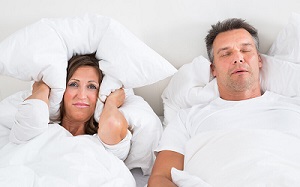
Snoring is when the air is unable to flow freely through your nose and throat while you’re sleeping, because the airway is blocked in some way. Often, this is caused by having too much tissue in the throat or nasal passage, or by your tongue getting in the way of your breathing. The air forcing its way through makes the tissues in your throat vibrate, which results in the sound we know as “snoring.” This problem can disrupt the quality of your sleep and lead to a variety of potential health issues including sleep apnea, which I’ve written about before in this post.
There are many reasons why people snore, and it’s not something a patient can usually prevent. Anyone with a low, thick soft palate might have a narrower airway. Someone who is overweight could have extra tissue in their neck and throat area, and this could reduce the space the air has to flow through. Other causes of snoring include:
Your mouth’s anatomy – if the piece of tissue that hangs in the throat (uvula) is longer than normal, it blocks the airflow and causes increased vibration.
Nasal problems – with our high levels of pollution today, many people suffer from nasal allergies or chronic congestion that create blockages. Some snorers have a deviated septum, which is a crooked passage in the nose that causes the airway to be narrower than it should be.
Drinking alcohol – as harmless as it may seem to many, even a single alcoholic drink before bedtime can cause your throat muscles to relax, leading to an obstruction that causes snoring.
Sleeping on your back – this might be the best sleeping position according to your chiropractor, but it’s also the one most likely to cause snoring. That’s because gravity drags your relaxed throat tissues downwards, which can result in a blockage of your airway.
There are also risk factors that predispose some people to snoring and sleep apnea, such as being male, overweight, or having a family history of snoring.
Some of the problems that arise from regular snoring can make a notable difference to your life. When you often miss out on a good night’s rest, you could find yourself experiencing symptoms such as:
Daytime fatigue and lack of energy
Irritability and depression
Difficulty concentrating or poor attention span
Headaches and sore throat on waking
Raised blood pressure levels
If your partner notices you have longer-than-normal pauses between breaths, you seem to stop breathing periodically, or wake up gasping and choking, you could be suffering from obstructive sleep apnea (OSA). Any or all of these symptoms can severely impact your quality of life and your overall health, so it’s best to get medical attention early. Your doctor may send you for sleep apnea test to determine how severe your condition is.
You might be wondering what snoring has to do with dentistry, but surprisingly an oral appliance is one of the simplest, most effective forms of treatment for mild to moderate sleep apnea. Custom-fitted mouth guards work in a non-surgical manner to keep your airway open. This prevents the obstruction that causes the snoring and helps you to avoid the symptoms the risks associated with sleep apnea.
Additional methods that are often used to help people reduce their snoring include machines that deliver continuous positive air pressure (CPAP) and other models. These are usually prescribed for people with moderate to severe apnea.
A mouth guard is most beneficial for mild to moderate sleep apnea sufferers, and it can help you to avoid needing to go the route of a CPAP, BiPAP or APAP machine. It can also benefit someone with severe apnea who has difficulty using a CPAP machine.
Many wearers report that using a mouth guard helps for their sleep apnea symptoms. Even if you don’t have apnea, a mouth guard can help to reduce your snoring and lower your chances of future problems.
Sleep apnea and snoring aren’t the same but neither are they mutually exclusive, and an oral appliance such as a mouth guard will help either condition—or both.
Snoring can cause you an array of health complaints, but it doesn’t have to be that way. For more information on how a custom mouth guard can reduce your snoring and prevent sleep apnea, please book an appointment with our dentists in Scarborough at 416-267-4661, or click here to book online.
Do you ever feel nervous about dentist appointments? Rest assured: we cater to nervous and anxious patients in a gentle and considerate manner. Call us now to schedule a free consultation!